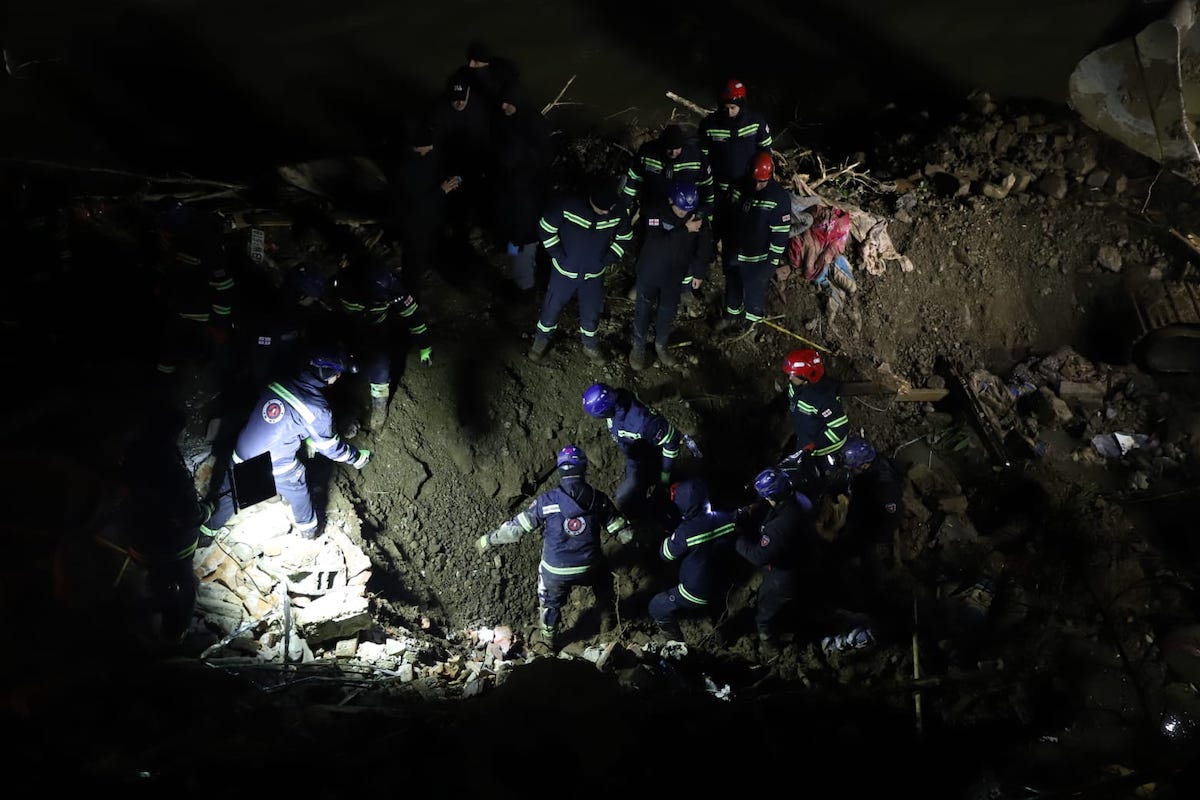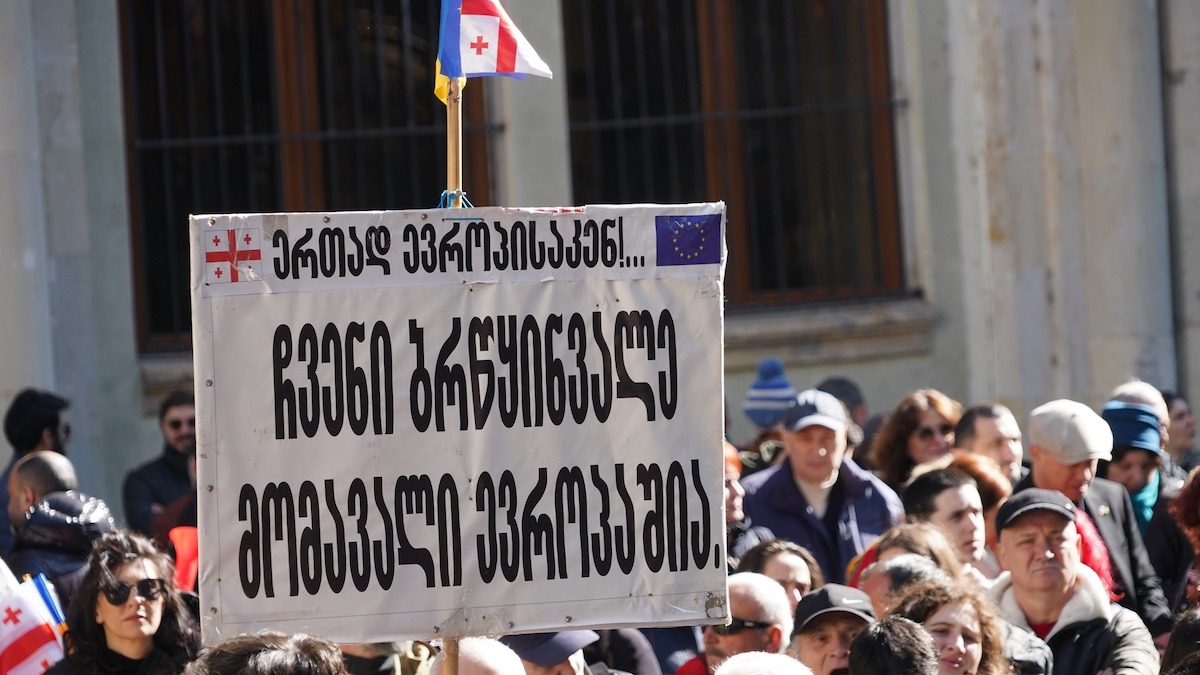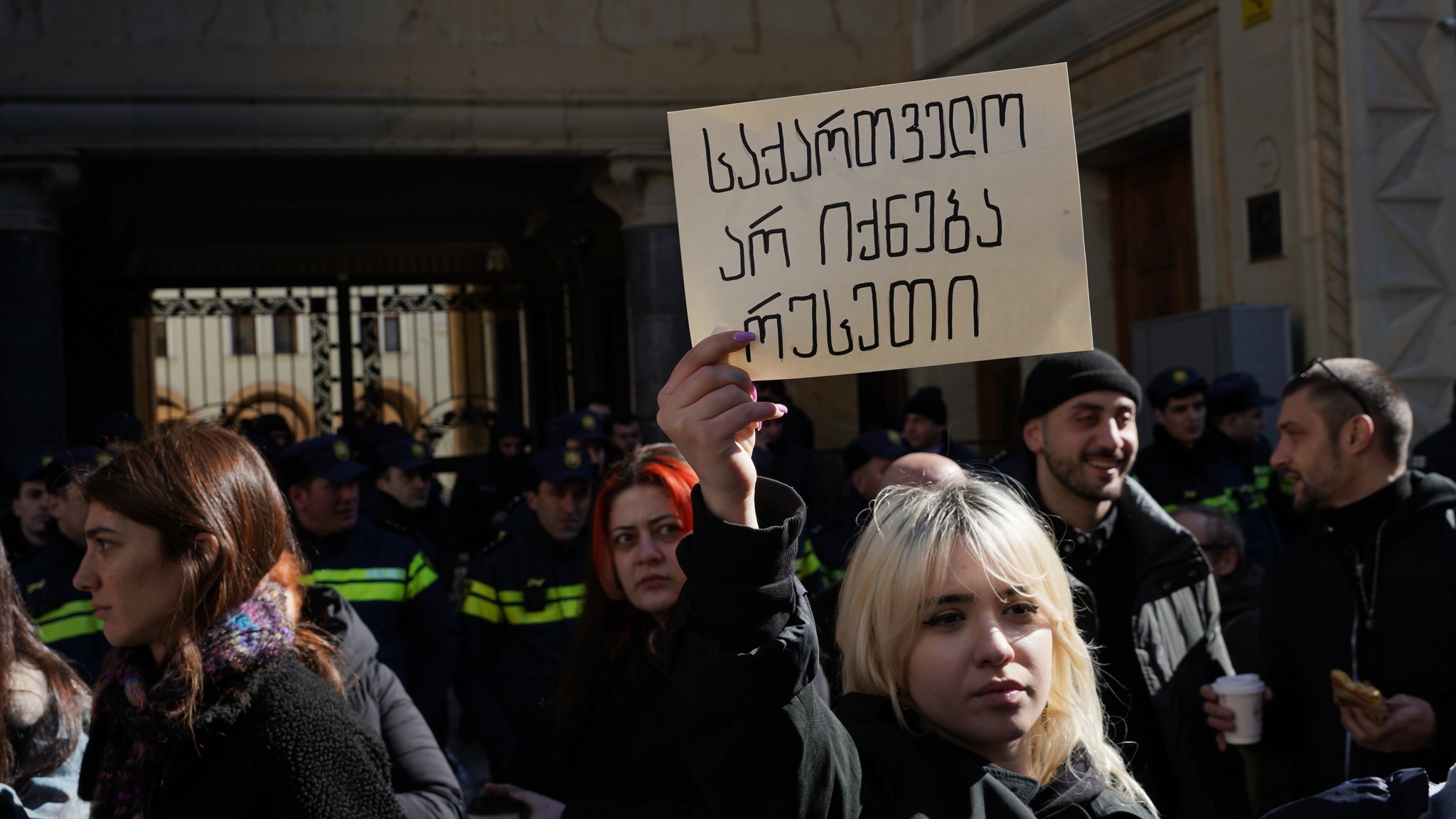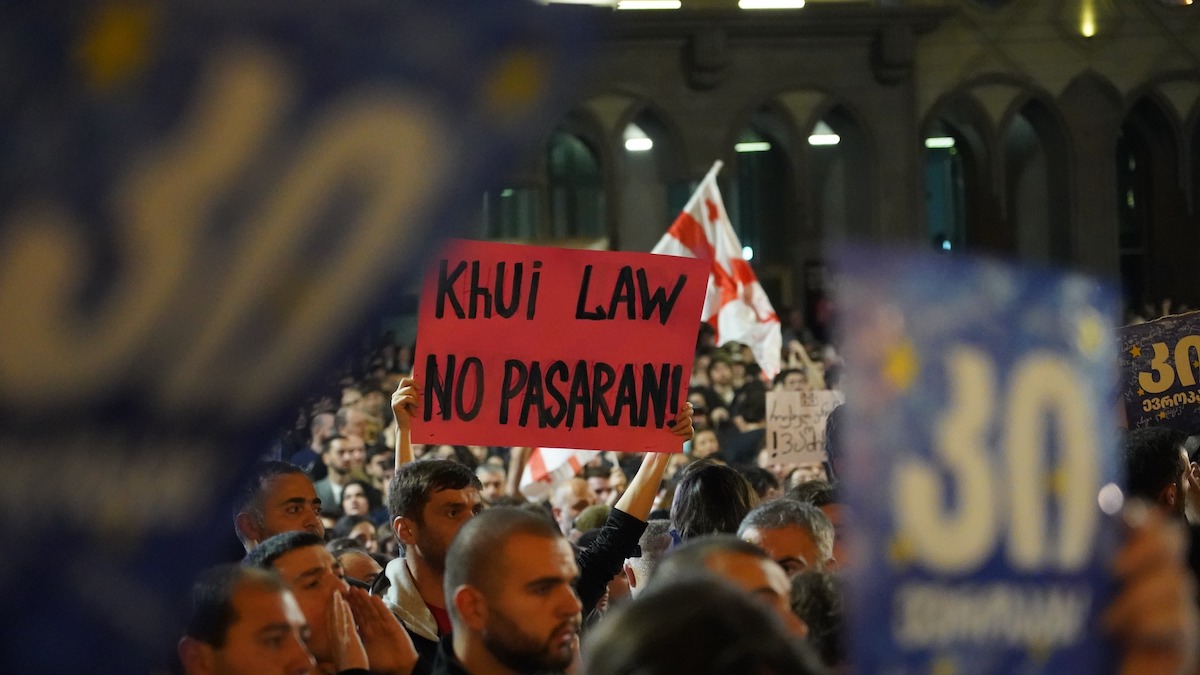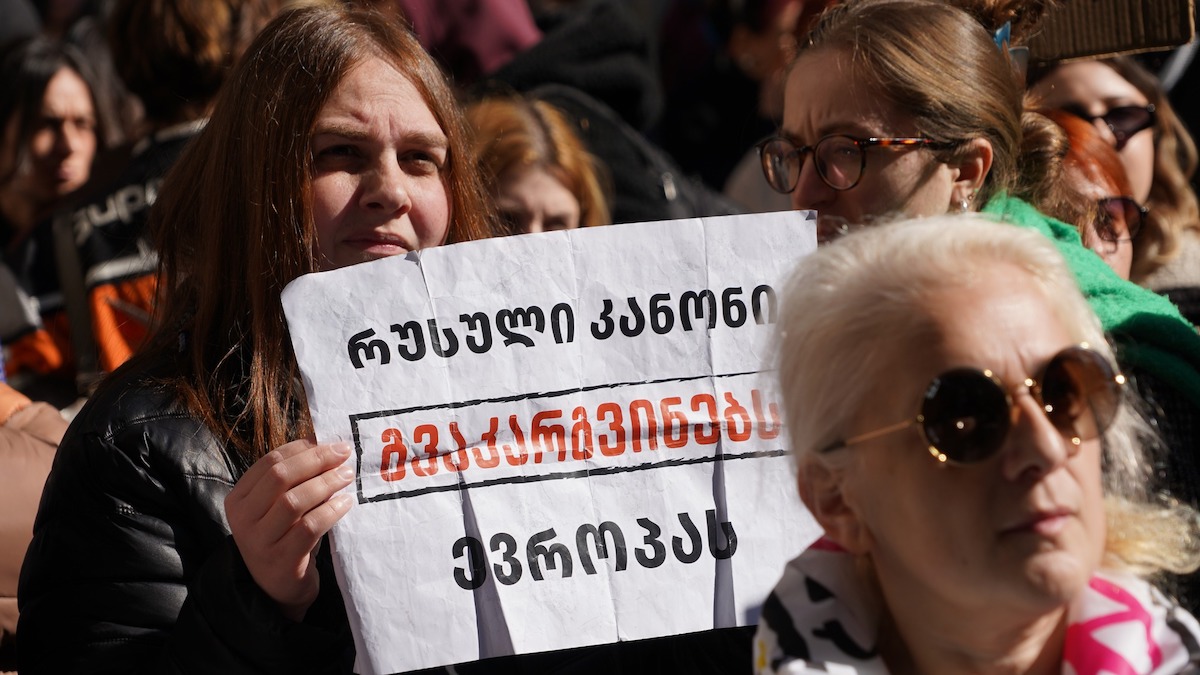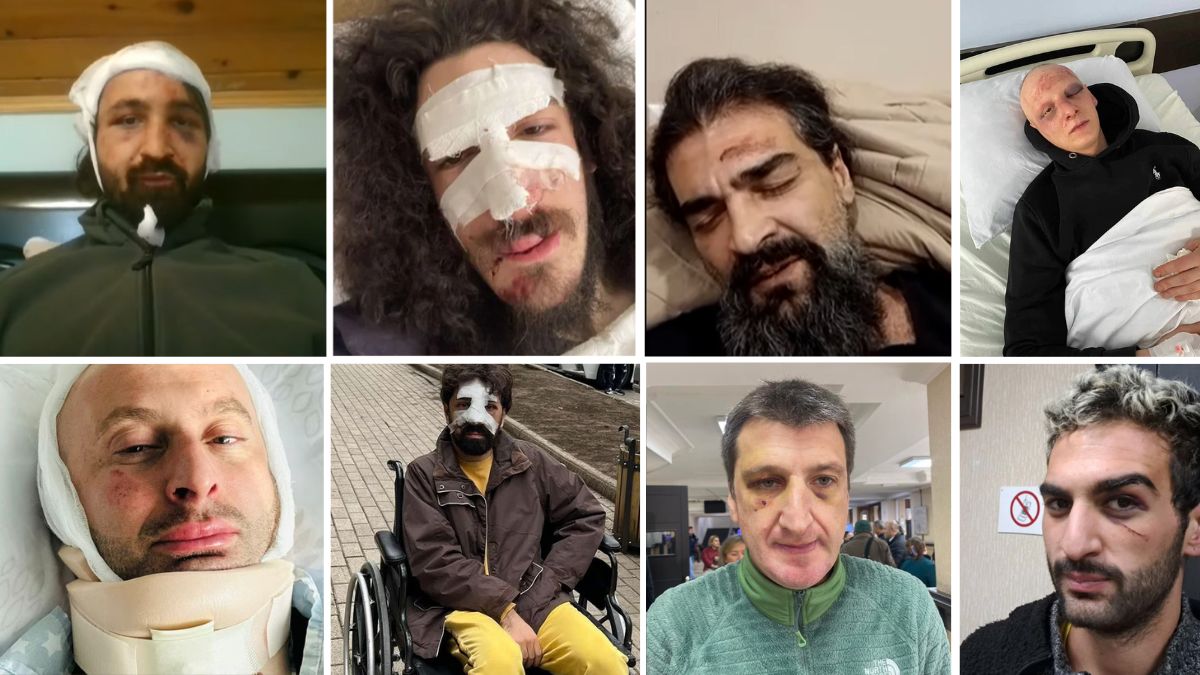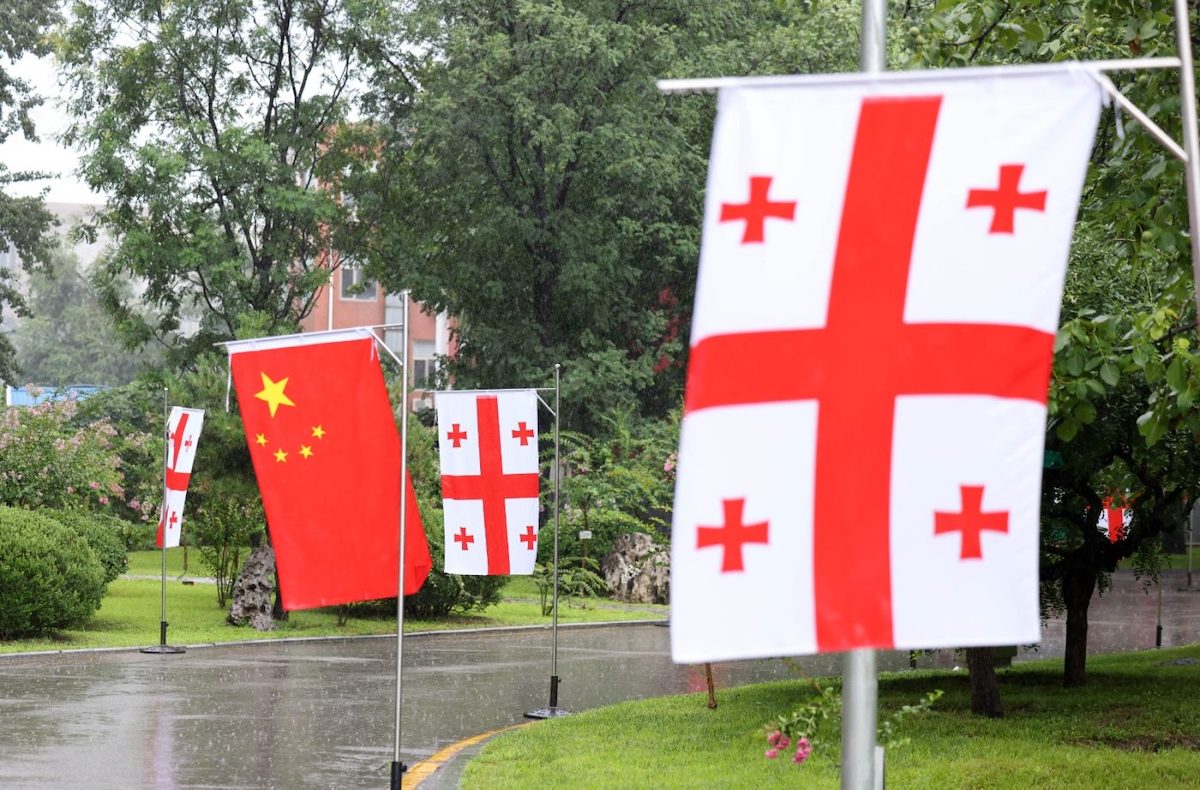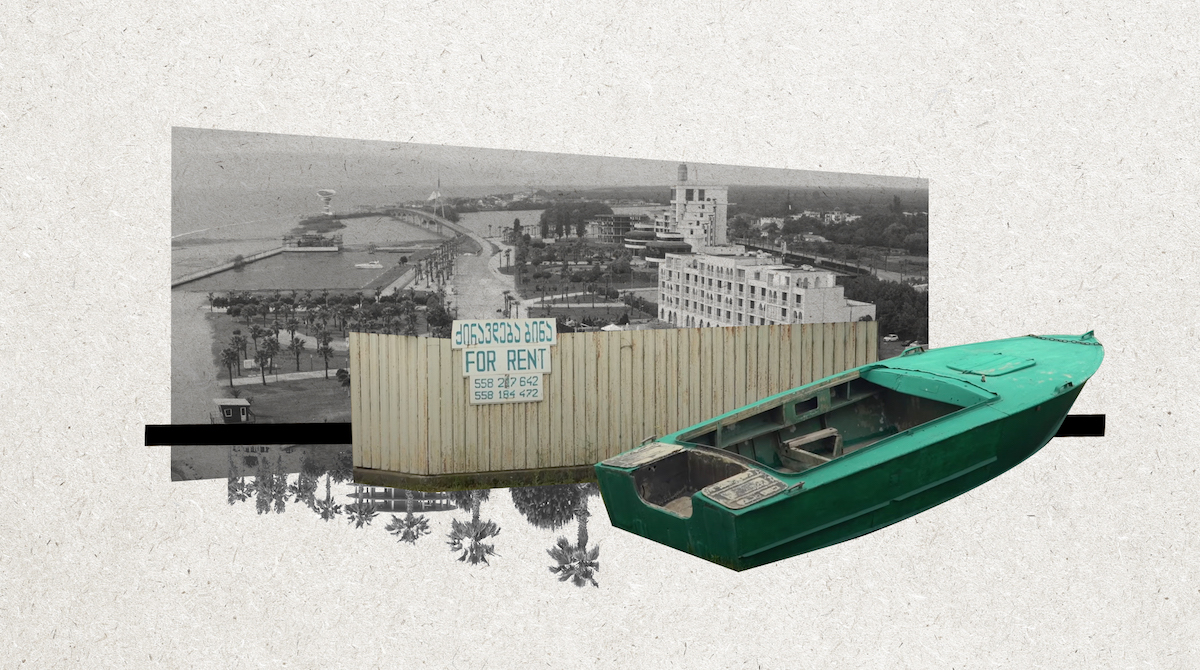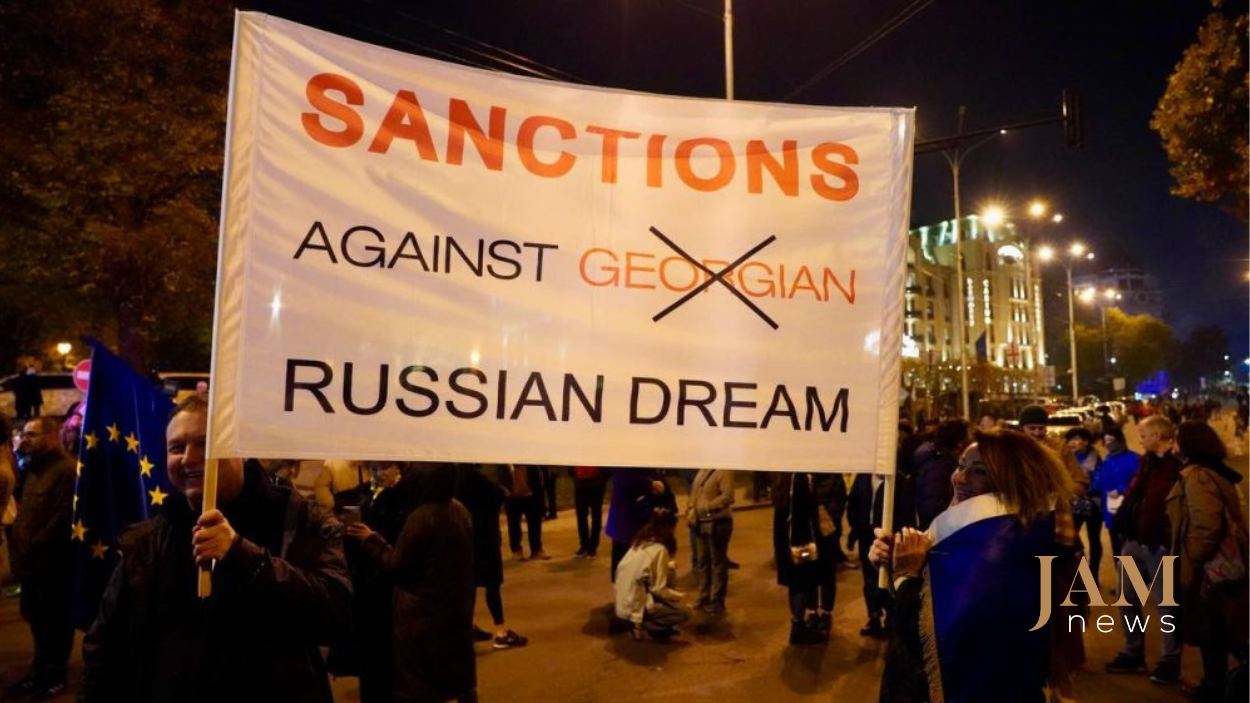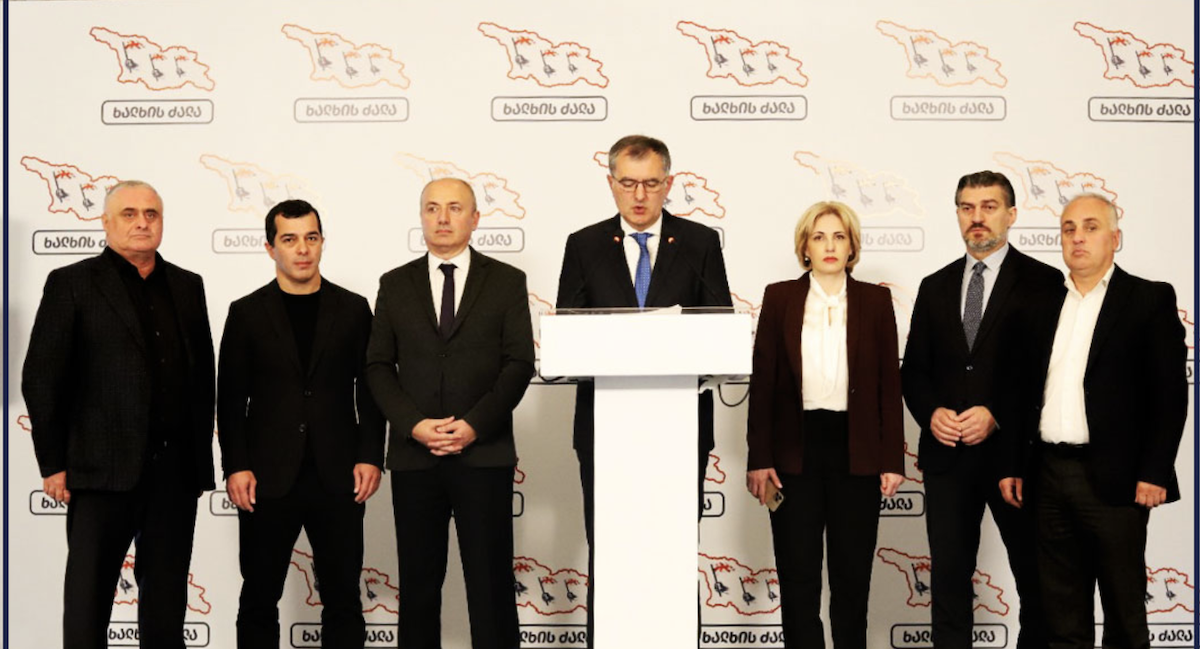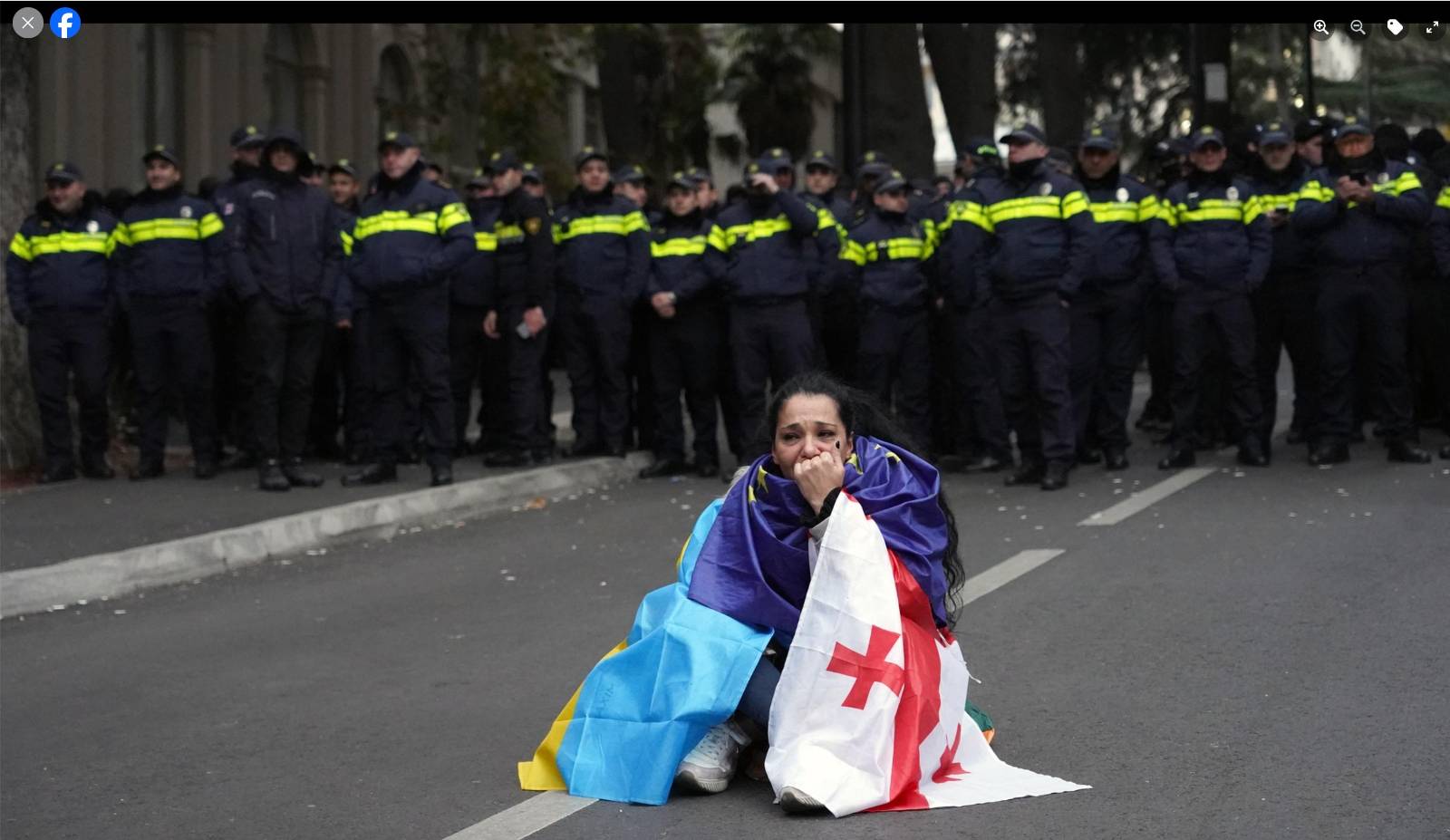
Key events in Georgia in 2024
The year 2024 will be remembered as one of the most transformative in Georgia’s modern history. Virtually every major development unfolded in the context of a shift in the country’s foreign policy orientation.
In a historic pivot, Georgia openly rejected its European aspirations, veered away from its pro-Western trajectory, and moved closer to Russia’s sphere of influence.
Yet alongside the anxiety and upheaval, 2024 also brought hope and inspiration. The year was marked by a determined struggle for the nation’s future, offering Georgians moments of solidarity and self-belief.
It was a year of human potential, filled with examples of unity, grassroots organization, and resilience.
The dramatic events of 2024, chronicled in this article, gave rise to a new civil society in Georgia, signaling a turning point for the nation.
 Irakli Kobakhidze appointed as Georgia’s new prime minister
Irakli Kobakhidze appointed as Georgia’s new prime minister
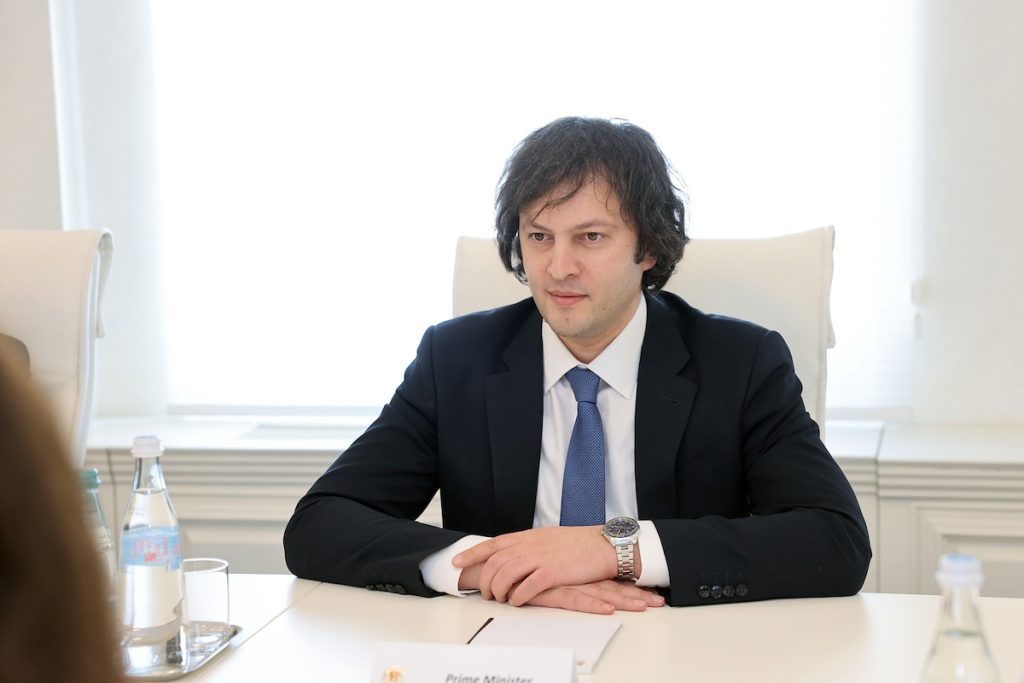
Georgia’s parliament approved 45-year-old Irakli Kobakhidze as the new prime minister on February 8, replacing Irakli Garibashvili.
Kobakhidze’s nomination was personally proposed by Bidzina Ivanishvili, the founder of the ruling Georgian Dream party and widely regarded as the country’s de facto ruler.
Shortly after his appointment, Kobakhidze released a 97-page government program titled “Building a European State,” outlining priorities such as advancing European integration, strengthening ties with EU institutions, enhancing Georgia’s transit potential, restoring territorial integrity, and deepening relations with the United States.
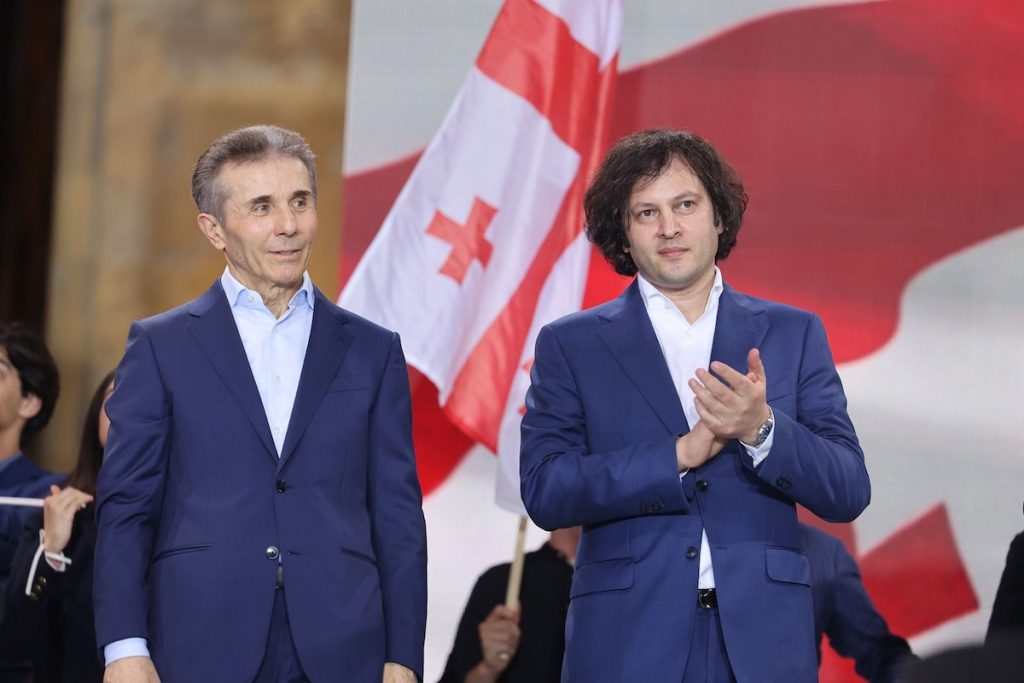
“The government program lays a solid foundation for the country’s rapid development in the coming years on national, regional, and global levels. It brings us closer to the historic goal of joining the European Union and serves the better future of every citizen,” the document states.
Irakli Kobakhidze’s first official visit as prime minister was to Brussels. Following the meeting, European Commission Vice President Josep Borrell told reporters that “this year will be a serious test for Georgian democracy.”
Georgian political analysts warned at the time that Georgian Dream is a hypocritical party that says one thing but does another.
 Landslide in Baghdati (Imereti region)
Landslide in Baghdati (Imereti region)
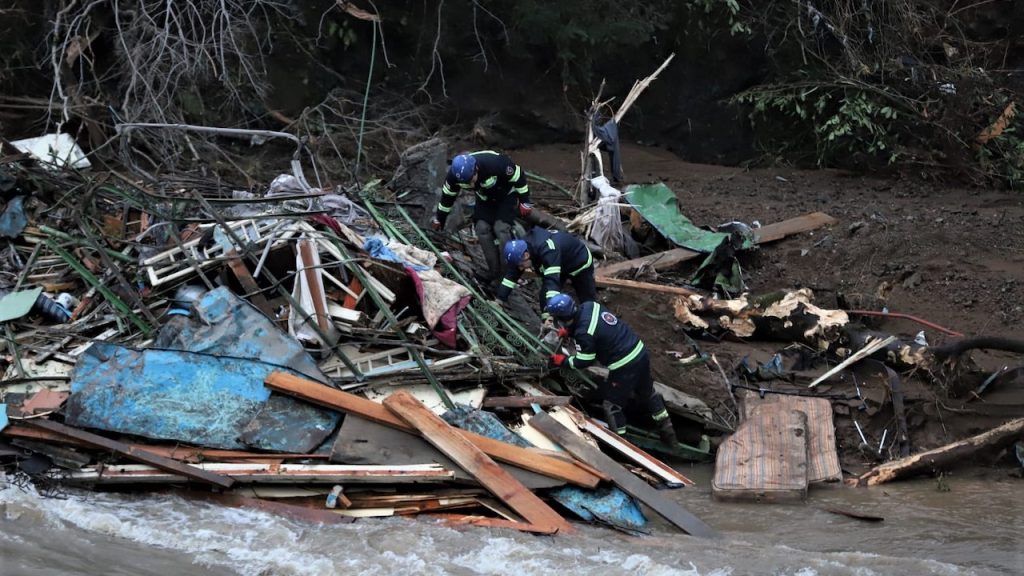
A landslide struck the village of Nergeti in western Georgia on February 7 at around 01:30 AM, destroying four residential homes. Over 200 firefighters and rescue workers from the emergency management service, assisted by sniffer dogs and heavy machinery, spent 24 hours searching for victims. The bodies of nine people were eventually recovered, including three children.
Landslides have been a persistent problem for Georgian villages for many years. With each storm, the situation in hundreds of villages across the country worsens, becoming increasingly life-threatening.
 The case of Lazare Grigoriadis
The case of Lazare Grigoriadis
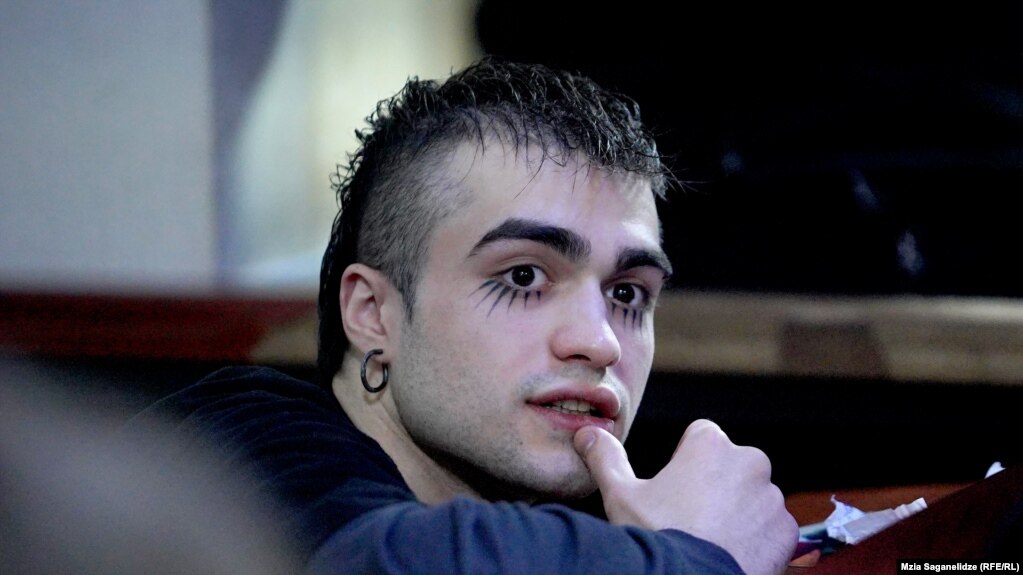
Lazare Grigoriadis, a young activist arrested during protests against the “foreign agents” law in March 2023, was sentenced to nine years in prison in April 2024. The 22-year-old was convicted of assaulting a police officer and damaging property.
On the same day, Georgian President Salome Zourabichvili pardoned Grigoriadis. He was released from prison on April 24.
 The “foreign agents” law 2.0
The “foreign agents” law 2.0
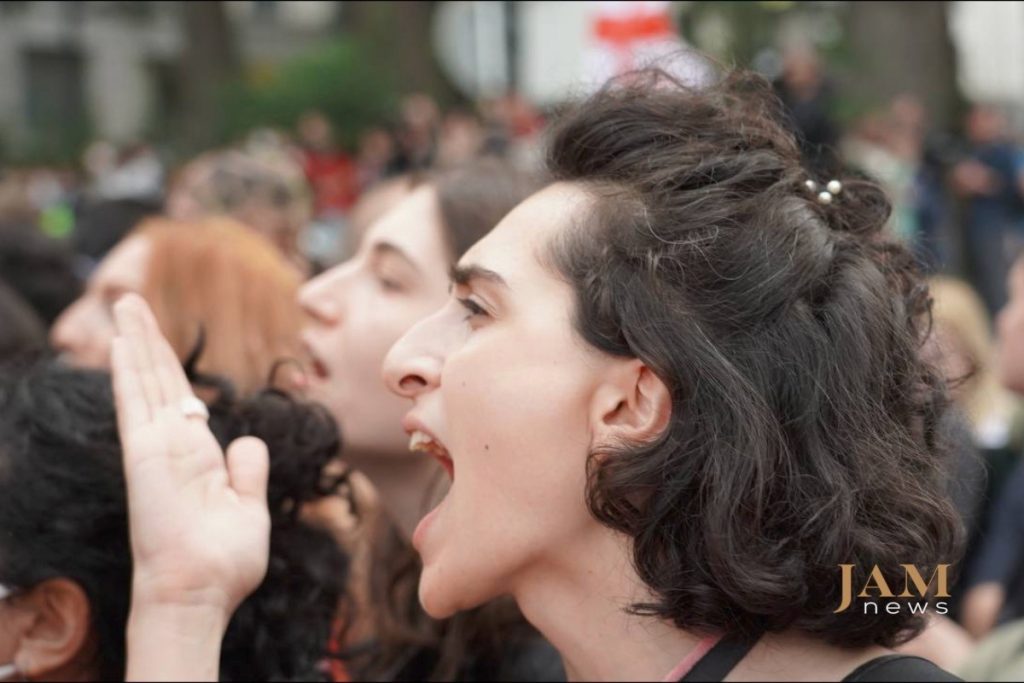
On April 3, Mamuka Mdinaradze, chairman of the Georgian Dream parliamentary faction, announced at a special briefing that the ruling party intends to reintroduce the “Transparency of Foreign Influence” bill, commonly referred to as the “Russian law” or the “foreign agents” law.
The announcement came as a surprise to civil society, which had successfully pushed authorities to withdraw the bill in 2023, after assurances it would not be reintroduced.
Tbilisi was soon swept by a new wave of protests, which were met with a harsh crackdown by authorities. For nearly a month and a half, the city became the scene of continuous demonstrations.
Despite massive demonstrations and sharp criticism from the West, Georgia’s parliament passed the “foreign agents” law on May 14 with a majority vote of 84 in favor and 30 against.
In a special report covering the period from the bill’s introduction to its adoption, the Georgian Young Lawyers’ Association described it as “two months of violence and repression.”
In addition to physical violence against protesters and critics of the law, psychological pressure and threats were also employed. Individuals faced threats and insults over the phone, offensive posters were placed on their homes and offices, and derogatory messages were left on their vehicles.

Leaders of Georgian Dream fiercely criticized both local opposition activists and Georgia’s Western partners who opposed the adoption of the “foreign agents” law.
Parliament Speaker Shalva Papuashvili was particularly vocal, frequently targeting critics. Following one of his Facebook posts, activist Zuka Berdzenishvili was brutally assaulted by unknown individuals.
Papuashvili also repeatedly made defamatory statements against JAMnews, which the outlet’s editors and partners condemned as an attempt to pressure and intimidate independent media.
 The offshore law
The offshore law
On April 19, Georgia’s parliament passed a bill in its third reading exempting the transfer of assets from offshore accounts to Georgia from taxation until 2028.
Opposition parties and experts criticized the legislation, arguing that it primarily serves the interests of Bidzina Ivanishvili.
Critics labeled the legislative initiative “cynical,” partly because it was pushed forward “under the radar”—simultaneously with the controversial “foreign agents” law amid ongoing protests.
For more details on the provisions of the offshore law, click here.
 Abolition of gender quotas
Abolition of gender quotas
On April 4, Georgia’s parliament abolished gender quotas that required a quarter of party electoral lists to be composed of women.
The quotas were introduced to encourage women’s participation in politics. At the time, Georgian Dream itself had enacted the gender quota, and local women’s organizations often expressed gratitude for this initiative.
 Georgia at the European Championship
Georgia at the European Championship

On March 26, in the final match of the Euro 2024 qualifiers, the Georgian national football team triumphed over Greece in a penalty shootout, securing their first-ever spot at the European Championship.
On June 18 in Dortmund, Georgia faced Turkey in the opening match of Group F at Euro 2024. This marked Georgia’s debut match at a European Championship.
Ultimately, Georgia played four matches at Euro 2024 and reached the Round of 16, becoming one of the top 16 teams. The team’s performance was praised by international media as a strong debut at such a high-level tournament.
Thousands of fans greeted the players upon their return home. The collective euphoria temporarily united the country, transcending gender, age, and political views. There was a sense that football could bridge a society deeply divided by politics.
However, this unity was short-lived.
 Georgia at the Olympics – Seven medals, two champions join Georgian Dream
Georgia at the Olympics – Seven medals, two champions join Georgian Dream
Georgian athletes won seven medals at the Paris Olympics, placing 21st in the medal standings.
Three of the medals were gold, earned by judoka Lasha Bekauri, wrestler Geno Petriashvili, and weightlifter Lasha Talakhadze.
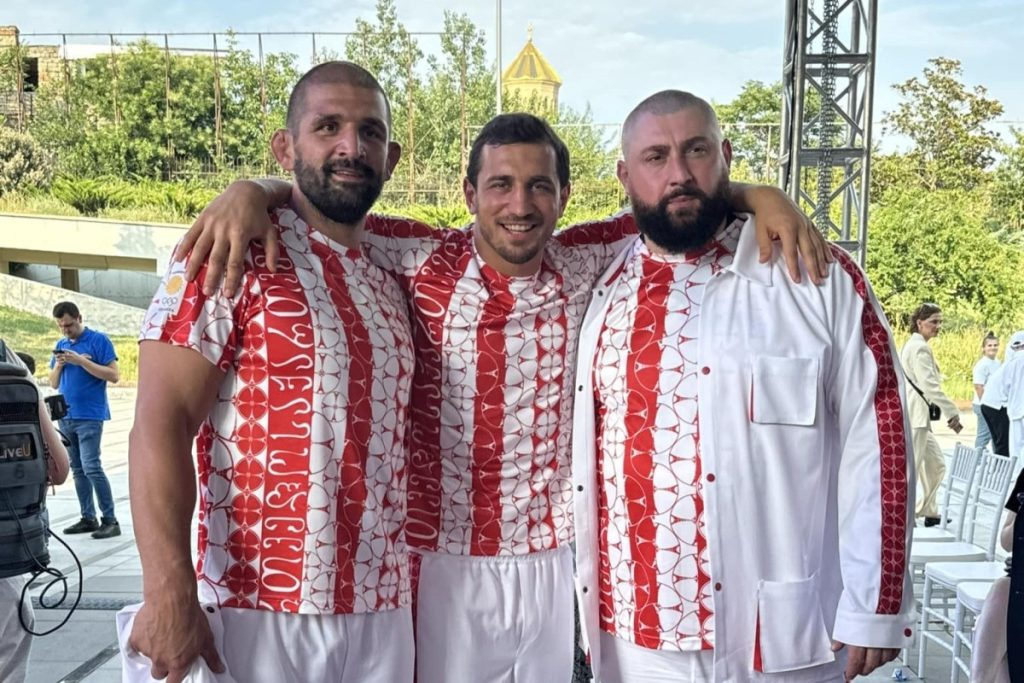
A month after the Olympics, two of the three gold medalists—Geno Petriashvili and Lasha Talakhadze—appeared on the Georgian Dream’s electoral list. In October, they became members of parliament, which is considered illegitimate by President Salome Zourabichvili, the opposition, most of civil society, and a large part of the population.
 Homophobic law
Homophobic law
On September 17, Georgia’s parliament passed a discriminatory and homophobic law against the LGBTQ+ community, similar to a law previously enacted in Russia.
In addition to banning public gatherings of LGBTQ+ individuals and their supporters, the law also legally prohibits LGBTQ+ couples from marrying and adopting children.
It is important to note that such actions were already impossible in Georgia.
In addition to worsening the legal status of the LGBTQ+ community in Georgia, the law also introduced censorship. For example, it bans media from broadcasting content that could be classified as “propaganda of LGBTQ+ relationships and incest.” The censorship also extends to books, films, and plays that may depict homosexual relationships.
According to Georgian Dream, the law is designed to protect Georgian society from “pseudo-liberal ideology and its inevitable harmful consequences.”
During public hearings prior to the law’s adoption, representatives of the ruling party visited Georgia’s regions, gathered civil servants, and convinced them that “LGBTQ+ propaganda could make you gay.”
Experts believe that the law, passed a month before the parliamentary elections, was necessary for Georgian Dream to mobilize conservative voters.
 The murder of Kesaria Abramidze
The murder of Kesaria Abramidze

On September 18, a day after the passage of the homophobic law, Kesaria Abramidze, Georgia’s most well-known transgender woman, was killed in Tbilisi.
The killer was a 26-year-old man who, “over a personal conflict,” stabbed Kesaria multiple times in her own apartment.
Kesaria Abramidze was one of the first transgender women in Georgia to publicly acknowledge her identity. She was a model, actress, and television host, actively participating in various talk shows.
Human rights defenders say that under Georgian Dream’s influence, homophobia has been intensifying in the country every year. They argue that the new anti-LGBTQ+ law particularly harms transgender people, as it restricts their access to healthcare, prevents them from obtaining legal gender recognition, and denies them other rights.
 Parliamentary Elections on October 26 – “A dark spot in Georgia’s history”
Parliamentary Elections on October 26 – “A dark spot in Georgia’s history”
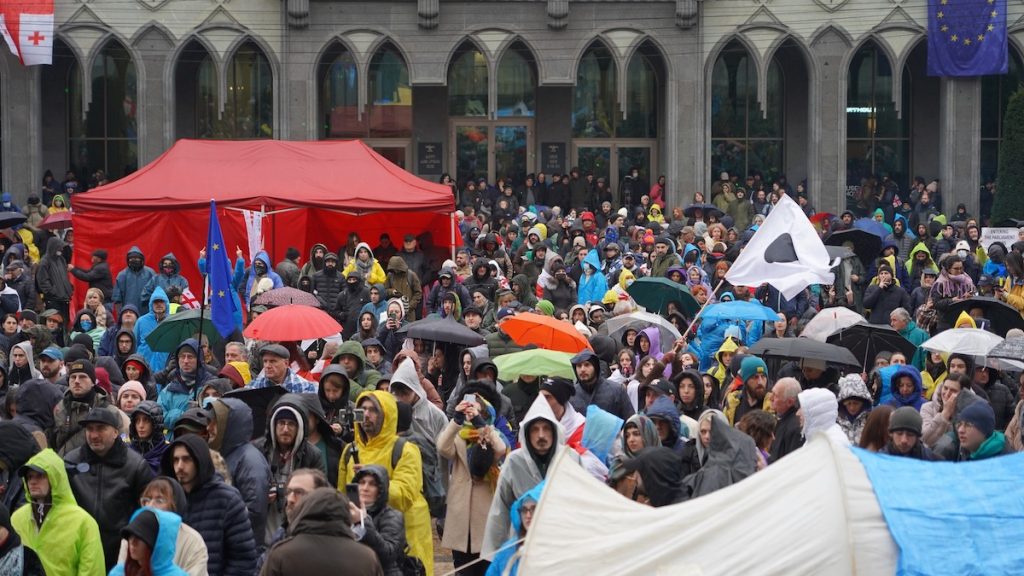
The parliamentary elections on October 26 in Georgia were considered historic and decisive for many reasons.
The elections followed a grueling and exhausting battle for the public against the “foreign agent” law, the rupture of strategic partnership with the United States, harsh anti-Western rhetoric from the authorities, and the subsequent sanctions.
For many, these elections became a sort of referendum. For Georgian Dream supporters, it was a choice between war and peace, while for pro-Western voters, it was a choice between returning to Russia’s orbit or embracing a European future.
An unprecedented number of people, who had never participated in such processes before—writers, artists, directors, doctors, civil activists, and students—observed the voting process.
Nevertheless, the violations detected on election day raise doubts about the legitimacy of the results.
In particular, the key principle of fair elections—the secrecy of the vote—was violated. The marker used by voters to mark their choice “showed through” on the reverse side of the ballot as a stain. This black stain later became a symbol of the rigged elections.
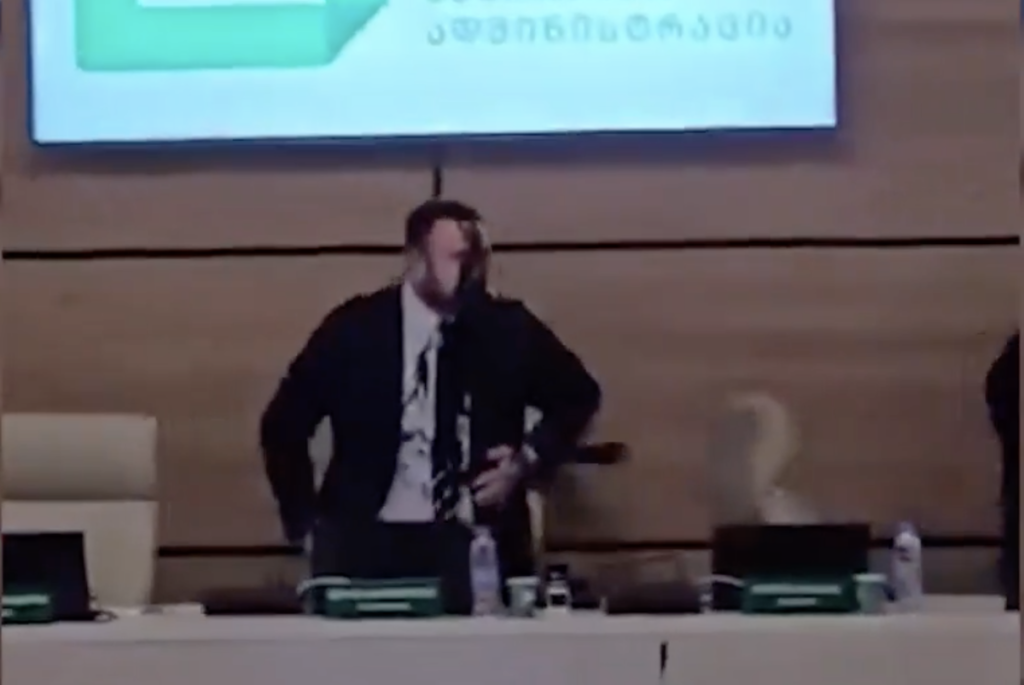
Among the most significant violations were “carousel” voting (when the same individuals vote multiple times at different polling stations), voting with other people’s identification cards or personal numbers, as well as voter intimidation, pressure, unprecedented use of administrative resources, and the expulsion of critical observers from polling stations.
As a result, the Georgian Dream party received 54% of the vote, 12% higher than the exit polls predicted. In the 11th convocation of Parliament, Georgian Dream secured 89 mandates out of 150, while four opposition platforms collectively obtained 61 mandates.
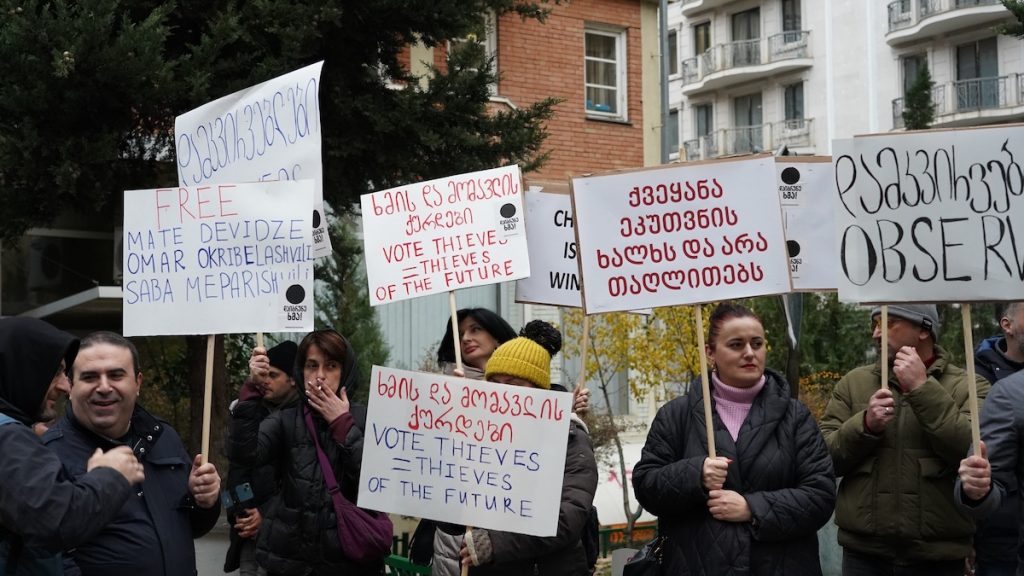
The credibility of these results has been questioned by the main international election observer — the OSCE/ODIHR. The organization’s conclusion states that the elections were held against a troubling backdrop, and the existing problems undermined voter confidence in the electoral process.
The opposition and the most active part of civil society have called the elections fraudulent.
Due to numerous violations, the election results were not recognized by European countries. Only Azerbaijan, Venezuela, Turkey, Armenia, Hungary, and China congratulated Georgian Dream on its victory.
The first session of the new parliament took place on November 25 amid a massive protest, with participants declaring the parliament illegitimate and self-proclaimed. President Salome Zourabichvili called the day “Black Monday.”
Only members of Georgian Dream attended the first session. The other four parties and coalitions that secured mandates refused to attend parliament.
 Statement of November 28 and pro-European protests
Statement of November 28 and pro-European protests
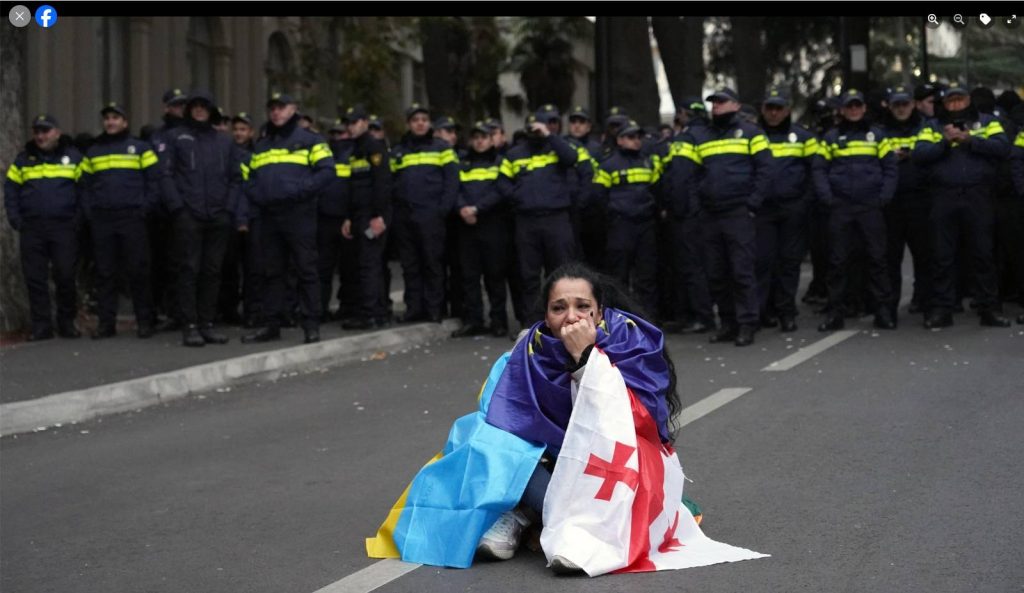
On the evening of November 28, Irakli Kobakhidze, appointed by the ruling party as prime minister, held a briefing at the headquarters of the Georgian Dream after a meeting with the parliamentary majority and the government team. He announced that Georgia would suspend its EU integration process until 2028.
Kobakhidze explained the decision by claiming that the European Union was allegedly using this issue to blackmail Georgia.
Immediately following the briefing, spontaneous mass protests broke out in Tbilisi and other cities, which continued at the time of publication. On some days, more than 200,000 people gathered in front of parliament in Tbilisi.
A new political movement effectively began in the country, led by the fifth president, Salome Zourabichvili. She became the center of pro-European protests and a unifying figure for the opposition.
Every day, tens of thousands of people took to the streets in Tbilisi and other Georgian cities to protest against the anti-European policies of the Georgian Dream. Their main demand was to call for new parliamentary elections, which would allow a legal change of government. There were also calls for the release of people arrested during the demonstrations.
Initially, law enforcement used special means against protesters, including stun guns, tear gas, and pepper spray. Hundreds of people were brutally beaten, most suffering facial injuries, with almost all sustaining concussions of varying degrees of severity.
More than 400 people were detained.
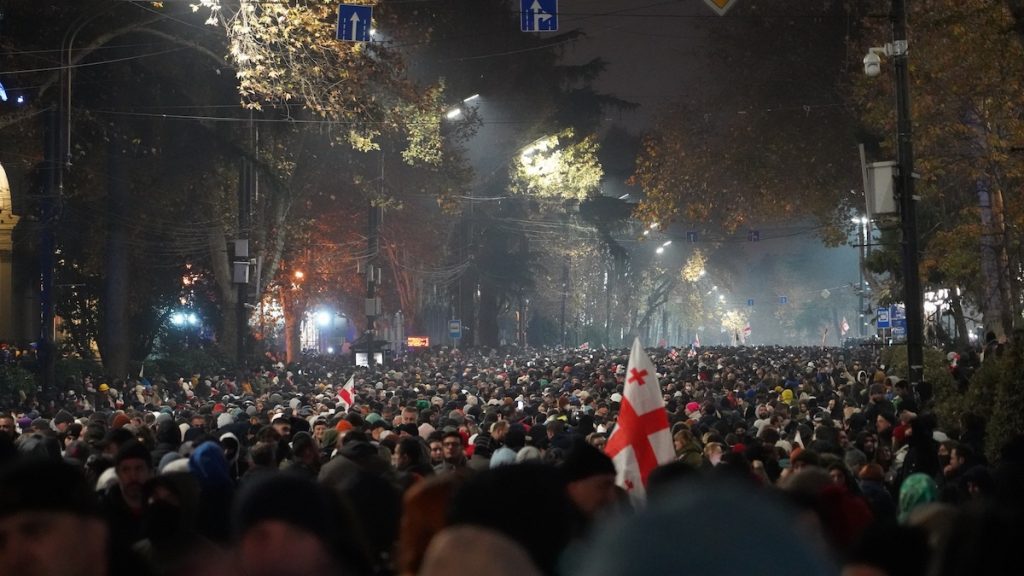
Among those brutally beaten and arrested were many journalists. Human rights defenders considered the police violence — including the brutal beating and robbery of demonstrators — as torture.
Alongside special forces, so-called “titushki” also target protest participants and journalists. These aggressive groups, dressed in black and wearing masks, attack and brutally beat people in the streets, near their homes, and even on public transport.
There is a widely held belief in society that these groups are either organized or supported by the “Georgian Dream.” No criminals have been held accountable so far.
#terrorinGeorgia : The Russian regime is back at work tonight in Tbilisi – chasing civilians through the streets as they flee terror, targeting politicians, media, artists …Breaking down the doors of opposition offices to raid and brutalize politicians inside pic.twitter.com/Mt71Bq7cbl
— Salome Zourabichvili (@Zourabichvili_S) December 7, 2024
At the same time, significant developments are unfolding in the public sector – officials and civil servants are issuing statements in support of the protesters and/or resigning from their positions.
Several ambassadors have resigned.
An unprecedented civil disobedience movement continues in Georgia. Universities and many public schools have temporarily suspended classes in protest.
Students and teachers from public schools have declared their support for the resistance movement, both in Tbilisi and other regions of Georgia.
Over two thousand local businesses, as well as prominent public figures, business representatives, and ethnic Georgians working abroad, have issued statements in support of the protesters and Georgia’s pro-European course.
The movement is supported by Georgia’s fifth president Salome Zourabichvili, alongside opposition leaders.
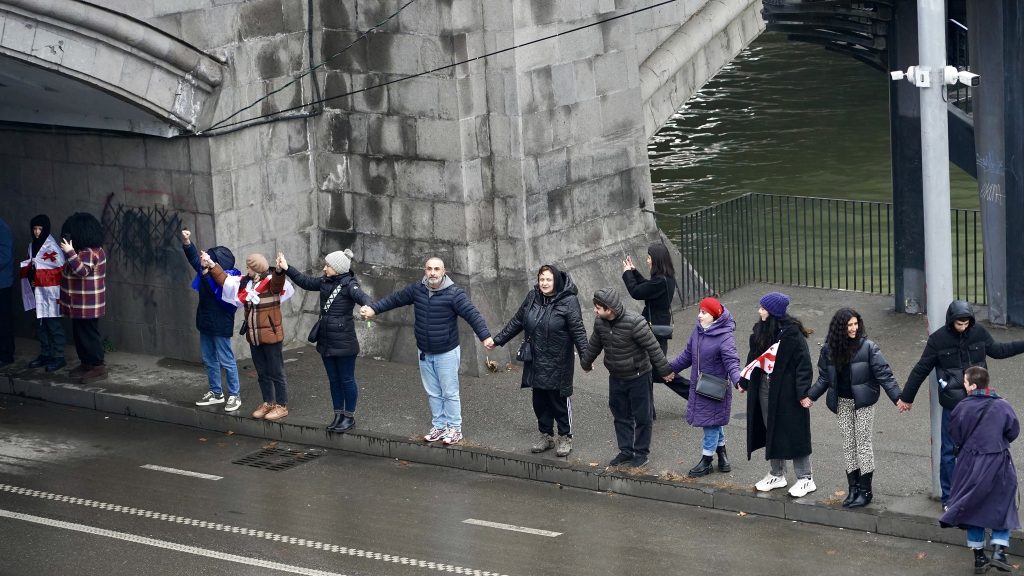
 “New enemies and new friends”
“New enemies and new friends”
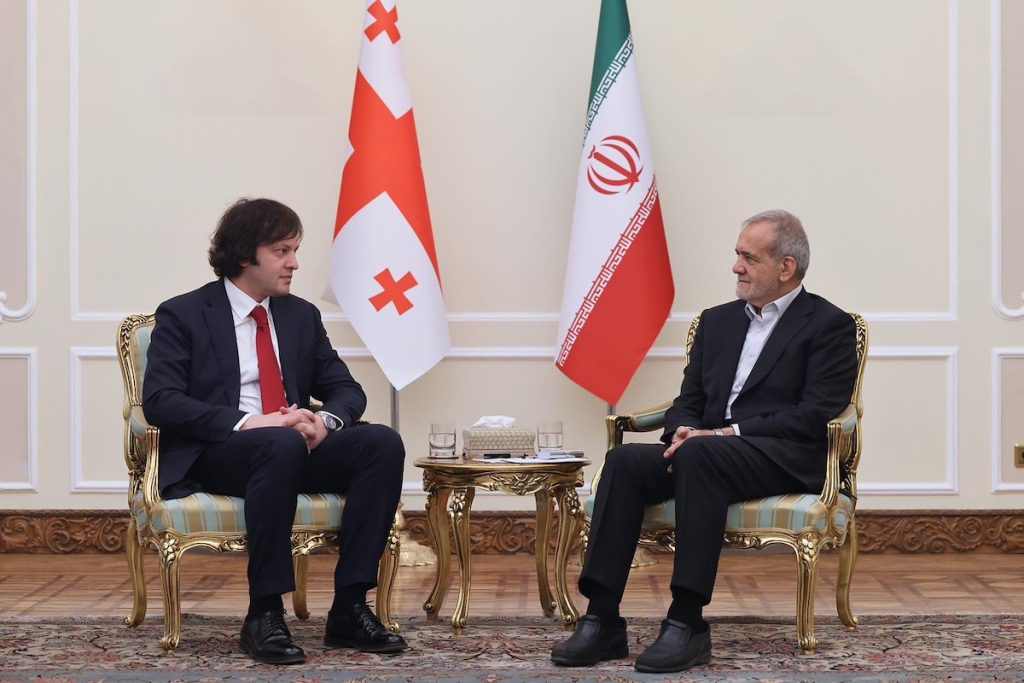
The year 2024 marked a period of sharp and overt changes in Georgia’s foreign policy.
Relations with traditional strategic partners, the United States and the European Union, notably deteriorated. However, at the same time, various forms of ties strengthened with countries such as China, Russia, and Iran.
On November 30, two days after Kobakhidze’s famous statement about suspending negotiations with the European Union, the U.S. State Department issued a statement announcing that the U.S. had suspended its strategic partnership with Georgia.
U.S. State Department spokesman Matthew Miller stated that the decision was due to recent undemocratic actions by the ruling Georgian Dream party, which violated the core principles of the strategic partnership between the U.S. and Georgia.
In 2024, it was also announced that a Chinese company would build the strategic Anaklia port.
This project was previously handled by an American consortium, but construction was halted in 2020 by the decision of the Georgian Dream. Four years later, the Chinese company won the rights to build the port in Anaklia.
Two visits by Georgian Prime Minister Irakli Kobakhidze to the Islamic Republic of Iran and group photos with Hamas leaders will remain part of the historical record of 2024.
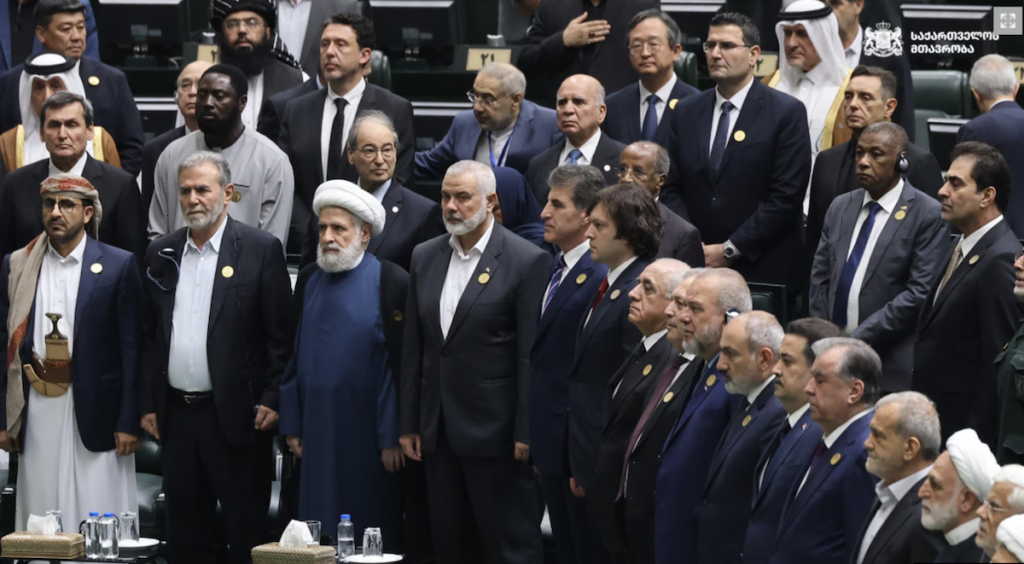
For the first time, Kobaidze visited Tehran for the funeral of the President of the Islamic Republic of Iran, and on his second visit, he attended the inauguration of the new president, Masoud Pezeshkian.
In photographs, Kobaidze is seen standing next to Hamas leader Ismail Haniyeh, who was killed by a direct missile strike just hours after the inauguration. At the end of December, Israel’s Defense Minister acknowledged that Israeli authorities were behind the killing.
During the event, where Kobaidze stood smiling, chants of “Death to America” and “Death to Israel” were heard.
This was the first visit by a high-ranking Georgian official to Iran in seven years. Experts note that Kobaidze’s visit sent a very clear signal to the West.
 Government under sanctions
Government under sanctions
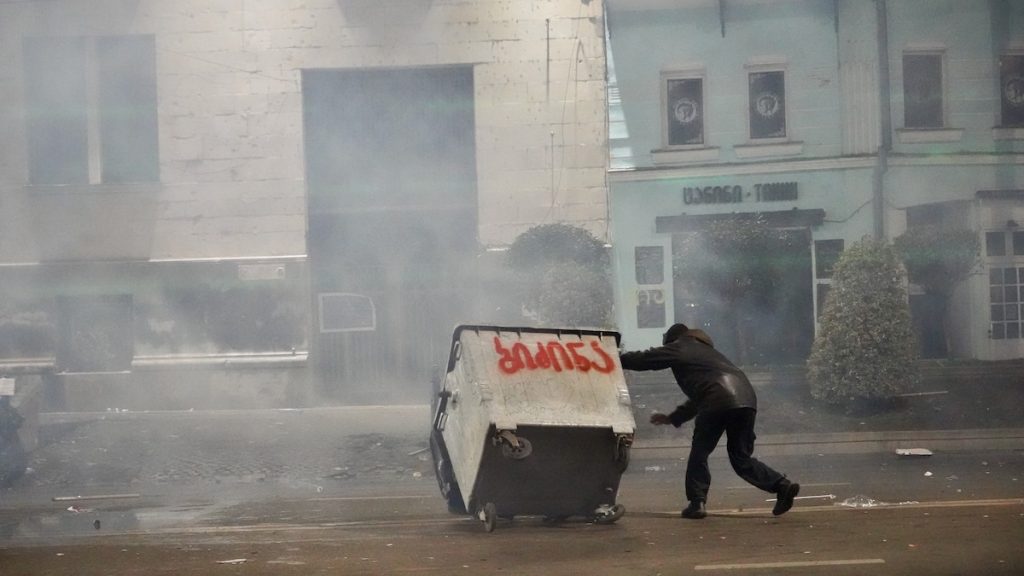
For the first time in Georgia’s history, its Western partners – the United States, European Union member states – imposed sanctions on dozens of high-ranking Georgian officials, judges, members of parliament, businessmen, private individuals, and other members of the ruling party, “Georgian Dream.”
On December 27, the U.S. Department of the Treasury imposed financial sanctions on Georgia’s de facto leader, founder and honorary chairman of the ruling party “Georgian Dream,” former prime minister, and billionaire Bidzina Ivanishvili.
According to the OFAC list, the sanctions against Ivanishvili are part of a broader package targeting Russia.
“Under the leadership of Bidzina Ivanishvili, ‘Georgian Dream’ advanced the interests of the Kremlin, undermining Georgia’s Euro-Atlantic trajectory, which directly contradicts both the Georgian Constitution and the will of the Georgian people,” the U.S. Treasury Department stated.
In 2023, the U.S. imposed visa restrictions on four members of Georgia’s Supreme Court. In 2024, immediately after the “foreign agents” law was passed, the U.S. and the European Union imposed sanctions on members of “Georgian Dream” and their families.
At this stage, several hundred people associated with “Georgian Dream” and their families are on the list of those barred from entering the U.S.
Hundreds of individuals with diplomatic passports were sanctioned by the European Union and are now banned from entering EU territory.
Six Georgian citizens were included in the “Magnitsky List,” the harshest sanction, which involves freezing all assets, shares, and financial holdings of the sanctioned individuals.
Among these six are four senior law enforcement officers: Interior Minister Vakhtang Gomelauri and his deputy Mirza Kezavadze, as well as the head of the special forces department Zviad Kharaishvili (known as “Khareba”) and his deputy, Miller Lagazauri.
More than 40 individuals were sanctioned by the Baltic states.
Ukraine imposed personal sanctions on 19 individuals.
 President from “Georgian Dream”
President from “Georgian Dream”
On the last Sunday of the year, December 29, the inauguration of Mikheil Kavelashvili, the sixth president of Georgia appointed by the “Georgian Dream,” took place in the parliamentary session hall.
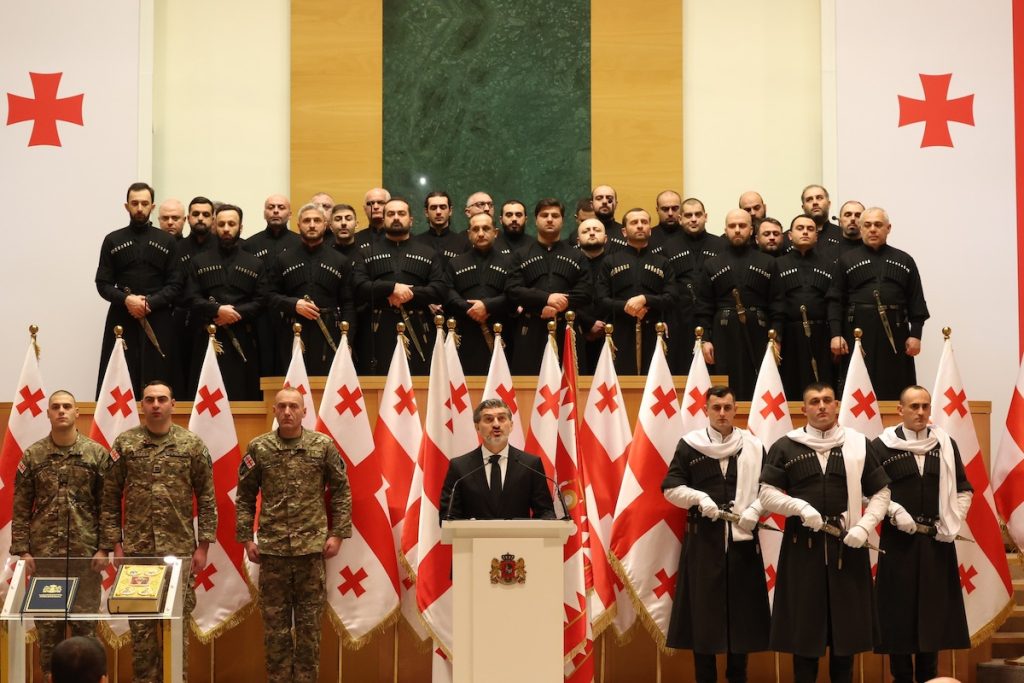
Kavelashvili is the first president in Georgia’s history to be elected not by the people, but by a special electoral college. He is also the first person in this role not recognized by any of the five former presidents, the opposition, civil society, or the hundreds of thousands of citizens protesting in the streets.
He was selected by members of the ruling party, Georgian Dream, on December 14, 2024, in parliament. However, the term “election” is somewhat misleading in this case. Kavelashvili was the only candidate for the presidency. A former footballer with no formal education, he was nominated personally by Bidzina Ivanishvili.
Kavelashvili is the leader of the most radically anti-Western and homophobic faction within Georgian Dream, the “People’s Power” movement. This political force initiated the “foreign agents” and anti-LGBT propaganda laws.
Mikheil Kavelashvili is known for his aggressive anti-Western rhetoric, homophobic statements, conspiracy theories, and crude insults against political opponents.
The opposition, civil society, and many representatives of Western countries consider the October 26 parliamentary elections in Georgia to have been rigged. Consequently, the 11th convocation of parliament, along with the government and president it has appointed, are deemed illegitimate.
Fifth President Salome Zourabichvili announced that she would remain in office as the sole legitimate authority in the country until new parliamentary elections are held. Her stance is supported by the opposition, civil society, and hundreds of thousands of citizens protesting in the streets.
On December 29, coinciding with the inauguration of Mikheil Kavelashvili by the ruling Georgian Dream party, Salome Zourabichvili left the Orbeliani Palace, the official presidential residence. Thousands gathered there to greet her as their acting president.
 “The Georgian ‘mad printer’”
“The Georgian ‘mad printer’”
On December 29, immediately following his inauguration, Georgian Dream-backed president Mikheil Kavelashvili signed a series of repressive laws significantly curtailing human rights in Georgia.
The Georgian Dream-dominated parliament had rushed these laws through in the days prior, at times holding the first, second, and third readings all in a single day.
The amendments include bans on covering faces and using pyrotechnics or lasers during public gatherings. Changes to the civil service law were also enacted, simplifying procedures for hiring and dismissing state employees, leaving civil servants more vulnerable to political pressure.
Interestingly, this latest move by Georgian Dream is not original but mirrors legislative changes implemented in Putin’s Russia in 2012. Even the haste with which the decisions were made reflects the Russian precedent.
At the time, Russia’s State Duma was directed to swiftly suppress mass protests still occurring in Moscow. Over the course of a few days, lawmakers passed dozens of major and minor legislative changes.
Russian media began referring to the State Duma as the “mad printer” to emphasize the speed and lack of proper deliberation behind the legislative process.
Ultimately, these laws in Russia made public protests and gatherings practically impossible and effectively illegal.
News in Georgia

